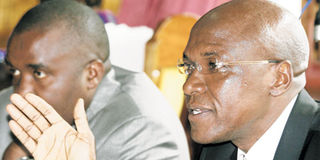Kimunya and CBK chief face the sack

Public Accounts Committee chairman Dr Bony Khalwale questions De La Rue officers at Parliament Buildings in May. Photo/FILE
Transport Minister Amos Kimunya is headed for a showdown with Parliament once again after he was indicted in the loss of Sh1.8 billion in public funds. Read (House team fails to finalise report on De La Rue deal)
The Public Accounts Committee on Wednesday asked Parliament to sanction the minister, together with Central Bank governor Njuguna Ndung’u for their role in the loss of the cash as a result of procurement of money-printing services.
The powerful parliamentary watchdog committee in a report tabled by the chairman, Dr Boni Khalwale (Ikolomani), says Mr Kimunya and Prof Ndung’u have to be held accountable for the loss.
The committee also wants Parliament to approve a resolution that the duo are unfit to hold public office, given that their conduct is not in line with the chapter on Leadership and Integrity in the Constitution, and the Public Officers Ethics Act.
“The Ethics and Anti-Corruption Commission should investigate them with a view to taking appropriate legal action against them and recovering lost funds,” the MPs noted in their report.
This is the second time that Mr Kimunya is on the chopping board in the House.
He was censured in 2008 for his role in the sale of the Grand Regency Hotel to Libyan investors.
Mr Kimunya, then Finance minister, stepped aside but was reinstated to the Cabinet after investigations cleared him. The currency printing loss also happened on his watch at the Treasury.
Prof Ndung’u, who survived censure in the House earlier in the year for mismanaging the depreciation of the shilling, will once again bank on his allies in Parliament to have his name cleared.
As the committee was working on the report, there were claims that an MP had attempted to influence its findings and recommendations.
But the committee said all members were unanimous in their recommendations.
“No member of the committee held a dissenting view on any of the observations, findings and recommendations in this report,” the committee noted in its report.
The committee also found out that De La Rue was “overcharging” the government, because, when the money-printing contract was put to competitive bidding, the firm bid lower.
The crux of the matter is that Mr Kimunya, then the minister of Finance, cancelled a long-term contract of Sh3.8 billion for 1.71 billion pieces of banknotes, and decided to go for four short-term contracts that cost the taxpayer Sh5.6 billion for 1.49 billion pieces of banknotes.
Though De La Rue got the deal on May 4, 2006 “for printing new generation banknotes, smaller in size and with advanced security features”, Mr Kimunya cancelled the contract in November 2007, saying that the government wanted to go into a joint venture with De La Rue.
“Mr Kimunya directed the Central Bank to cancel a cheap contract even when his ministry was not party to the contract and all the reasons he gave for the cancellation of the contract were found by the Committee to have been invalid,” the PAC report noted.
“Prof Ndung’u on the other hand did not make any effort to resist the directive from Mr Kimunya to cancel the contract. In so doing, he failed to protect the Bank’s independence and taxpayers’ interest. This was even notwithstanding the fact that since the Procurement and Disposal Act of 2005 came into force, Treasury had no business directing Central Bank of Kenya on procurement issues.”



